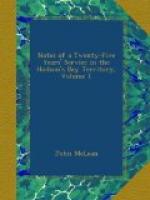They are immoderately fond of ardent spirits, men, women and—shocking to say—children. This hateful vice, which contributes more than any other to the debasement of human nature, seems to produce more baneful effects upon the Indian, both physically and morally, than upon the European. The worst propensities of his nature are excited by it. While under the influence of this demon he spares neither friend nor foe; and in many instances the members of his own family become the victims either of his fury or his lust.
The crime of incest is by no means unknown among them; rum, the greatest scourge and curse of the Indian race, is undoubtedly the principal cause of this dreadful corruption: but is it not strange that religion should have so little effect in reforming their manners? The Mississagays, the neighbours of the Algonquins, who speak the same language, were only converted a few years ago by the Methodists, and from being the most dissipated and depraved of Indians, are now become sober, industrious and devout.
It seems, therefore, impossible even for the most unprejudiced to avoid the conclusion that the difference in manners must in a great measure be ascribed to the different methods adopted by the Roman Catholic and Protestant missionaries in converting the natives. The Roman Catholic convert is first baptized, then instructed in the forms of worship, taught to repeat Pater nosters and Ave Marias, to make the sign of the cross, and to confess. He is now a member of the Church, and is dismissed to his woods—a Christian, can we say? The Methodists pursue a different course. Their converts must not only reform their lives, but give indubitable proofs that they are reformed; they are taught so as to understand thoroughly the sound principles of Christianity; and they must give an account of their faith, and a reason for the hope that is in them, before they are admitted as members of the Christian community. “The tree is known by its fruits.”
The Sachems, or chiefs of the Algonquins, possess little or no authority, but their advice is of some weight There are gradations of rank in the chieftainship; the Kitchi Okima, or great chief, takes precedence at the Council, and propounds the subject of discussion; the inferior chiefs (Okimas) speak in turn, according to seniority; every old man, however, whether chief or not, is allowed to give his opinion, and the general voice of the assembly decides the question at issue. It is seldom, however, that any question arises requiring much deliberation in the present times of peace. When a party of strange Indians arrives at the village, a council is called to ascertain the means the community may possess of discharging properly the rites of hospitality; each individual states the modicum he is willing to contribute, in cash or in kind, and the proceeds, which are always sufficient to entertain the guests sumptuously, according to Indian ideas, while they remain, are placed at the disposal of the Kitchi Okima.




